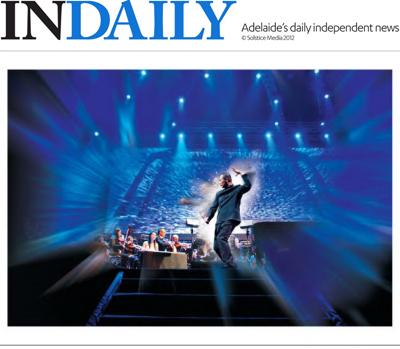Diana Carroll is an arts writer and reviewer - READ MORE HERE  STAGE: OzAsia Festival Tan Dun: Martial Arts Trilogy and Fire & Water DIANA CARROLL - Reviewer INDAILY - 24.9.12 THESE two events embody everything an arts festival should offer: creative fusions, Australian premiere performances, and internationally acclaimed artists. Tan Dun is an award-winning composer. You may not recognise his name but you will know the films he's scored: Hero, The Banquet, and Crouching Tiger, Hidden Dragon have all enjoyed worldwide success and made Tan an acclaimed composer. On Saturday night (and Sunday afternoon), Tan led the Adelaide Symphony Orchestra and stellar guest artists in Martial Arts Trilogy, a concert of music from these films, accompanied by back-projected sequences of each one. The unifying element in these films is the tragic heroine – beautiful, determined, and doomed. The OzAsia Festival has elevated this performance from a "greatest movie hits" showcase to a serious orchestral concert. Tan himself has likened it to The Ring Cycle. As a "greatest hits", it is superb, but I'm not sure it has the musical chops to be anything more. This is movie music – mood music, essentially – and should be appreciated for the art-form that it is; it doesn't need to be made into something more. The great achievement of these scores is their ability to capture the drama, the environment, and the action of the movies. Tan, an American Chinese, has said he is interested in Chinese philosophy and "the balance between that which already exists, and that which has not yet come to be". There is a more immediate duality evident in all these works – East and West, music and film, triumph and tragedy, hope and despair, love and loss. I was excited to see both Martial Arts Trilogy and Fire & Water (a recital by the same performers at The Space Theatre on Friday night). Such is my love of Chinese cinema, I have trekked to the Film Studios on the outskirts of Shanghai and Beijing to see where so many Chinese movies are made. It is the balletic conflict that I love – whether it's 10,000 warriors in battle or one-on-one duelling to the death, the carefully choreographed hyper-realism touches something deep in my imagination. Cellist Li-Wei was the soloist for the Crouching Tiger Concerto. Li-Wei is a delight to watch, taming his instrument as one might tame a much-loved but still wild animal. He coaxes his cello to make strange, wonderful sounds, but never takes it for granted. If instruments have souls, this is how they sound. The violin solos in the Hero Concerto were played magnificently by the ASO's concert-master Natsuko Yoshimoto. We are privileged to have Yoshimoto here in Adelaide, given her international reputation. Her disciplined playing was the perfect counterpoint to the sentimental score. It was intriguing throughout how the strings were made to sound like Chinese strings. The usually restrained players were strumming, plucking and thumping their instruments with enthusiasm. The clapping bamboo sounds were so convincing, it seemed like a recording. Chinese pianist Jiayi Sun gave voice to Empress Ano in The Banquet Concerto. Sun has a magical touch, capable of playing the most complex runs with an exuberant insouciance. Apart from a little elbow-grinding, this was a lyrical, almost romantic piece. The heroine of these two performances was unquestionably Xiaoxia Xhao, a brilliant musician and master of that most classical Chinese instrument, the guqin (pronounced here as goo-chin). Xiaoxia Zhao has won a plethora of awards and prizes for her mastery of the guqin, so it is wonderful to see her perform in person. The more intimate setting of the recital in the Space Theatre afforded a better appreciation of the instrument than the grandiose concert setting. The recital offered rich rewards – a performer, an instrument, a score. Minimalist but extremely satisfying. One of the pieces played is believed to be more than 2000 years old – what an astonishing history. A minor quibble: I wanted to hear Xiaoxia Zhao talk about the music. Perhaps she doesn't speak English, but it would have been more meaningful to hear her speak and have a translator, rather than listen to an ASO staffer introduce her pieces. I wanted to hear her voice, her passion. These are universal qualities, not tied to a language. The Trilogy was also exciting, integrating the full weight of the orchestra with filmic backdrops. It is always interesting to see a composer conduct his own music, especially with a largely unknown orchestra. For this performance, cameras mounted on the rostra enabled the audience to see Tan as he conducted. The positioning of the cameras meant it was a rather skewed viewpoint, but it was still interesting to see his facial expressions – especially as a telephone rang insistently in the stalls. These pieces rely heavily on the percussion section for their dramatic effect but the players are unseen to the great majority of the audience. A rather more creative approach to staging could have easily overcome this barrier between audience and instruments. Tan Dun also gave a Masterclass as part of the OzAsia Festival, another wonderful opportunity to engage with this brilliant musician. Cellist Li-Wei will be back performing with the Adelaide Symphony Orchestra in The Protecting Veil at St Peter's Cathedral on November 9; this promises to be a superb performance. ENDS. |
|
To Contact Diana Carroll International Pty Ltd: Email: dc@DianaCarroll.com Telephone: +61 0419 829 667 |